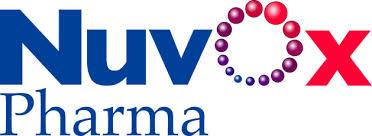Pre-hospital treatment of traumatic brain injury (TBI) with co-existing polytrauma is complicated by requirements for intravenous fluid volume vs. hypotensive resuscitation. A low volume, small particle-size-oxygen-carrier perfluorocarbon emulsion NVX-428 (dodecafluoropentane emulsion; 2% w/v) could improve brain tissue with minimal additional fluid volume. This study examined whether the oxygen-carrier NVX-428 shows safety and efficacy for pre-hospital treatment of TBI. Anesthetized swine underwent fluid percussion injury TBI and received 1 mL/kg IV NVX-428 (TBI-NVX) at 15 min (T15) or normal saline (no-treatment) (TBI-NON). Similarly, uninjured swine received NVX-428 (SHAM-NVX) or normal saline (SHAM-NON). Animals were monitored and measurements were taken for physiological and neurological parameters before euthanasia at the six-hour mark (T360). Histopathological analysis was performed on paraffin embedded tissues. Physiological, biochemical and blood gas parameters were not different, with the exception of a significant but transient increase in mean pulmonary artery pressure observed in the TBI-experimental group immediately after drug administration. There were no initial differences in brain oxygenation at baseline, but over time oxygen decreased ~50% in both TBI groups. Histological brain injury scores were similar between TBI-NVX and TBI-NON, although a number of subcategories (spongiosis-ischemic/dead neurons-hemorrhage-edema) in TBI-NVX had a tendency for lower scores. The cerebellum showed significantly lower spongiosis and ischemic/dead neuron injury scores and a lower number of Fluoro-Jade-B-positive cerebellar-Purkinje-cells after NVX-428 treatment compared to controls. NVX-428 may assist in mitigating secondary cellular brain damage.






